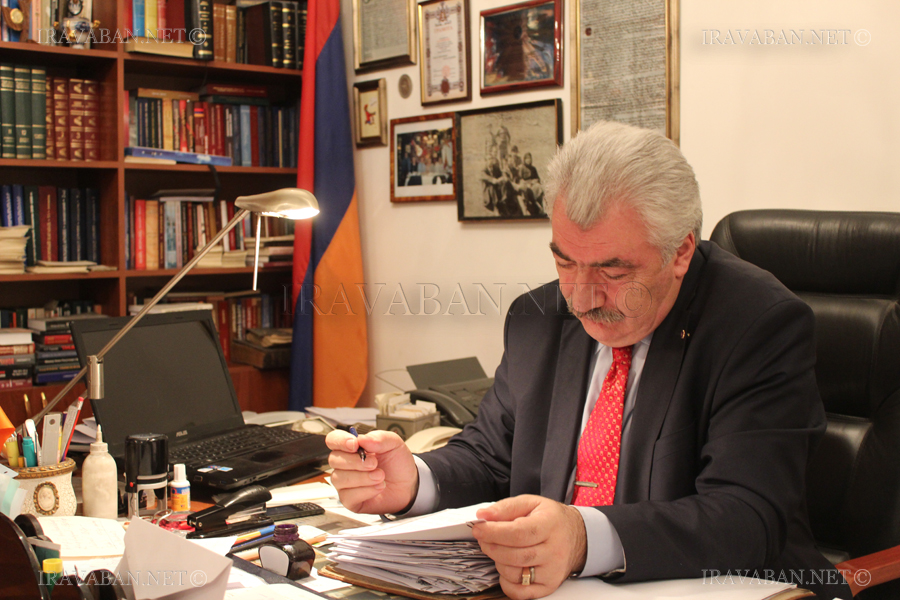We met with Mr. Amatuni Virabyan, the Director of the National Archive in the evening on 21 April. despite the fact that the issue of the Armenian genocide is often considered in the emotional field, but the interview is not so emotional, but rather a legal one. Mr. Virabyan himself asked the most important questions: The most important questions. What do we demand and how?
Details in the interview with Mr. Amatuni Virabyan, the Director of the National Archive.
– Mr. Viravbyan, we are trying to meet for the interview with you for already several days, however it is delayed due to different reasons, and now we have met at such a late hour. As I understand there is a lot of work. Please tell what preparatory works have been done before April 24?
– It is already the second week that we organize exhibitions in several communities, dedicated to 100th commemoration of the Armenian Genocide. We have selected the places, where hundreds of thousands of survivors of the genocide and tens of thousands of refugees and orphans found home. Aimed to restore the memory of the locals we exhibited documents and photos. I should note that the citizens were very interested in it. We also presented a film.
– Mr. Virabyan, just now I have in my hand one of your interviews in 2012. The title is a little extraordinary “The Director of the National Eagle promises to publish exclusive Photos about the Armenian Genocide.”
– Yes.
– As I understand, the speech is about three-volume collection “Genocide of Armenians in Ottoman Turkey.”
– Of course, and we have translated it into three languages, Russian, Turkish and English. The Spanish version is ready, and we are thinking about the Arabic, Japanese, German and French translations. We shall publish the 4tha and the 5th volumes of the collection. Just now we are working on the electronic database of the victims. We intend to collect the names of around 200-300 thousand victims. Naturally, it’s not a million and a half, as it is not possible to collect all – the time had its role in it. First of all, there are no witnesses and people that are able to name the names. But as long as possible, we have to save from oblivion the names that is still possible to find. I should note that the vast bulk of the documentation about the economic losses that the Armenian people had suffered, and these documents should also be published., There will be around 20-22 thousand-page volumes. We leave this for the future.
– Frankly speaking this year the Armenian Genocide issue was of great interest among the international public.
– The number “100” had its role. In the meantime, let me note that our policy on this issue is lacking. Look, we are commemorate the 90th anniversary then comes silence after the 95-years again silence. Still, it seems to me that some things changed. I hope that after the 100-year it will not be the end resonance and that something will change in our policy. Dynamics should be preserved I honestly did not expect the reaction that occurred in the last 1-2 months.
– On the occasion of the 100th year of the Armenian Genocide, “we remember and demand” What do we demand?
– It is a difficult question. I have thought over it a lot: what do we demand? recognition? The process is going on. Monetary or property compensation. I am strictly against it.
– Why?
– It turns out to be compensation for blood. We demand areas? Frankly speaking I do not think it is practically or theoretically possible. What will happen to the people living in those areas, Kurds for example? In addition, today we have so many areas that are not populated. However, I know the answer, Turkey should apologize.
– Let’s try to understand how we demand. Let’s shift our interview to the legal framework. What facts do we have to make our demand more solid and durable? You said you are working on the database of victims, and that there are thousands of documents about the economic losses which the Armenian people suffered. Is this enough from the legal aspect to sustain our claim?
– This is the most complicated thing – preparation of the corresponding documents from the legal aspect. We do not have nothing other but the recorded facts. There are settlements, maps, which currently do not exists, townships and cities, which currently do not exists, but at the same time we do not have any documents at hand with which the Turkish Government had instructed to exterminate the Armenians. Yes, there was a deportation order, there is a document, but this is not the destruction of the population in the long run. I am saying the following: if we want to create a legal ground, then we have to do a serious work during long years. work seriously. This is not an emotional speech, a major scientific and legal work should be done. Every step should be tested, considering the counter steps of the Turks, in the language of chess all our efforts should be thoughtful. So, the most difficult thing is bringing the word “I demand” to the legal field. Our state cannot claim territories, because ultimately we have ratified Conventions accepting the principle of inviolability of borders. The only possible way is that the areas are voluntarily given.
– But is possible to return the church premises at least?
– This problem is easier to solve. Today we carry out serious works in this direction and find relevant documents. In this way it is possible to achieve some success. The work is still in process. There are the so called property certificates available. The documents are being prepared now and we shall finish the work in 1-2 months.
Interview and photos: Gevorg Tosunyan
Author of the Idea: Karen Zadoyan















